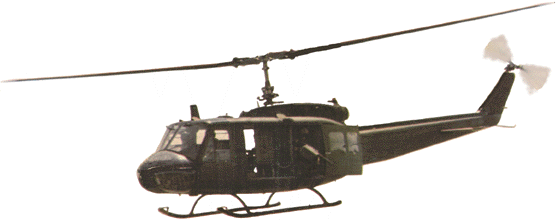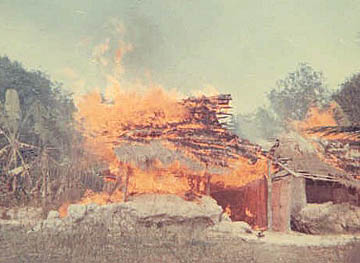War itself may be hell, but flying in a helicopter was always a
thrilling experience for me. And of all the helicopter flights we took, nothing
equaled the Eagle flight for sheer excitement. Like eagles swooping down on their
prey from on high, a flight of nine choppers would drop suddenly upon suspected enemy
positions, and we'd jump out to sweep the area before mounting up again to hit another
target.
One morning, bright and early at 7:00 o'clock, we lined up in the meadow outside Keane.
After a short wait we heard the distant drumming of choppers. Down they came
- nine huge olive birds drifting to the ground in a whirlwind of dust and noise. The
engines slowed and the huge blades fell into a steady thwumping beat, seemingly impatient
to be up and going again.
In a moment we were loaded, six or seven men to a chopper. The engines roared
into a deeper, faster rhythm, and our machine trembled as the blades clawed the air,
trying to pull away from the ground. The throbbing beat echoed through our bodies.
For a moment we were one with the chopper, struggling to lift free of the earth, to climb
into the cooler air above, to feel the rush of wind over our faces as the machine rose
faster and higher.
There is a fascination and a feeling of raw power in flying machines. Hanging by
the shaft of a single rotating blade, we could sit motionless thousands of feet above the
hot brown fields stretched out beneath us. The lives of earthbound beings were
circumscribed by the green walls that surrounded them. High above, our horizons
stretched away into the hazy miles across the broad plain below, changing, moving, always
new and different. We were free of the dirt and the water, free of the slow plodding
of their daily lives. For a short time we were away from the war even as we were
moving closer to it.
High above the ground we could see the shimmering reflections from rice paddies full of
water, like a thousand geometric mirrors scattered across the surface. The gentle
haze blended colors into a pastel mosaic, with soft greens and browns and blues.
Meandering streams and rivers, and the broad Mekong, traced their curving arcs in cocoa
lines across the plain below. To the northwest, its bold black shape rising like
some villain's fortress out of the distant haze, stood Nui Ba Den, the only mountain on
the plains. And the cool breeze aloft helped us forget, for a moment, the unyielding
heat of the fields below.
While we floated serenely along, watching the scenery, gunships and Cobras were out
hunting for game. We stayed aloft until a likely target presented itself, and then
our nine choppers dropped to a few hundred feet and came slowly to the ground as if to
land. Then, with a sound just like a normal liftoff, they picked up speed and raced
away at treetop level, heading for another, less publicized rendezvous.
This was the fun part. Patches of forest flashed past, the tree tops just missing our
fuselage. Then there was a gap in the trees and the pilots dropped lower, no more
than twenty feet from the ground. On we raced. Water buffalo, surprised by the
sudden appearance of a flight of thundering warplanes, scattered in all directions in
front of us.
Then, just ahead, smoke curled up from behind a thin belt of trees and bamboo.
Cobras were circling, firing rockets and cluster-rounds into the field beyond.
The Hueys dropped to the ground this side of the hedgerow. We scrambled out,
crouching, and sprinted out of the way of the departing choppers. The two Cobras
were still going at it, their miniguns blazing away. Then one tilted forward and
tore off in a new direction, and in a moment he was out of sight. The other broke
off the engagement and widened his pattern, making large circles over the area just ahead.
We formed into a single column, each man about five yards apart, and started toward
the hedgerow.
This was the first time I'd been near fighting, and fear now began to take hold of me.
This seemed to be a natural ambush, with thick forest on both sides of us, and a
wall of bamboo in front of us. We were walking in an open field with grass about two
feet high. There was no cover to protect us from enemy fire. As we moved
closer to the trees ahead, my apprehension grew. I quietly flicked my M-16 selector switch from safety to full automatic. My eyes
scanned back and forth, watching for the slightest sign of movement. But fortunately
my hunch, strong as it was, proved false. We passed into the hedge unharmed, and
emerged safely on the other side to see the results of the shooting.
Another field lay before us covered with dry, brown grass. Old rice dikes lay
buried beneath weeds and grass. We stretched out into a long line and slowly moved
across the field, searching for bodies. Halfway across we found three enemy
soldiers, dead. They had been caught in the open when the Cobras appeared.
These were the first bodies I'd seen. There were to be many more. Somehow
they didn't look like Communists or Viet Cong, or even enemies. They were just
people. I still knew that in a firefight, it was them or us. But it wasn't
quite what I had expected . . .
All three wore the traditional pajama uniform typical of soldier and peasant alike.
One had a green Chinese-Communist style cap with a small red star on the front.
He was probably their leader. He also wore a US Army web belt, to which were
attached two American fragmentation grenades and an old World War II style pineapple
grenade. A Chicom AK assault rifle with attached bayonet lay on the ground beside
him. One of the other men carried an old bolt-action rifle and a sling of
ammunition. The third carried an RPG - a rocket-propelled grenade launcher - with
several rocket rounds in his back pack.
The remaining Cobra was now hovering near the edge of the tree line - we weren't done
yet. We left the bodies and moved on. Thirty yards from the edge of the woods
we found two VC sitting on the ground, their hands on their heads. They had decided
to surrender and were simply waiting for us to arrive.
We searched the prisoners, and then took shelter in the shade of the nearby trees to
wait. Soon a lone Huey appeared over the trees and settled gently onto the field.
Three men in camouflage uniforms disembarked and moved toward us. One was a
captain, another was obviously Vietnamese - an interrogation team. For ten or
fifteen minutes they talked quietly with the two prisoners, and then the captain came over
to tell our commanding officer that at least half a dozen more men were hiding in the
woods, including an officer and the local VC chieftain. We spread out in small
groups to search the woods
As we searched we came across mud hootches with small
courtyards cut in the forest. At the far side a small Vietnamese man approached us
with his arms in the air. We motioned him forward with the peculiar, palm downward
"shoo-shoo" motion used by the Vietnamese to signal "come here".
After a short interrogation, the Captain ordered us to surround a nearby clump of
trees. He called out in Vietnamese, and three more men emerged with their hands up.
They had had their fill of those terrible fighting birds in the sky. They
brought out several more grenades and two AK assault rifles. Now, only the leaders
were still hiding in the area we had just searched. Back into the brush we went.
Thirty minutes of determined searching yielded nothing. We looked up into each
tree. We searched every bush. We poked for hidden tunnel
entrances and concealed pits. Finally we reached the mud huts again. We pushed
our rifles into the thatch roofs to see if anyone was hidden there. Then one man
moved a crude wooden table in the corner of a single-room hut. A thin, woven mat lay
on the floor, and as the GI lifted the mat, he saw a trap door hidden in the dirt floor.
We took covering positions as the door was carefully raised. It was halfway
open when two pistol shots rang out from below. The door dropped like a hot potato
and the man flung himself back just in time.
 We decided to let the interpreters handle negotiations. After a brief shouting
match with the enemy hidden in the concealed chamber, the door slowly lifted, a gun was
thrown up onto the floor, and a Vietnamese in uniform climbed out. A uniform was
something we didn't often see. This was the lieutenant we were looking for.
We decided to let the interpreters handle negotiations. After a brief shouting
match with the enemy hidden in the concealed chamber, the door slowly lifted, a gun was
thrown up onto the floor, and a Vietnamese in uniform climbed out. A uniform was
something we didn't often see. This was the lieutenant we were looking for.
We didn't find the VC chieftain. He either escaped unnoticed, or concealed
himself in an even more clever fashion. To discourage the use of the area by other
enemy units, we were ordered to burn the thatched roofs and destroy what we could of the
buildings and crops around them. Soon the roofs were blazing and the area was
covered with a cloud of smoke.
And after all that work it was only ten in the morning. Still plenty of daylight
left for several more Eagle flights before heading home. We moved out to the open
fields and formed up, and soon we were on our way to another area, and another sweep.
The Cobras had been busy while we searched the woods. They had another hot
area lined up, and more VC casualties and suspects, waiting just for us.
